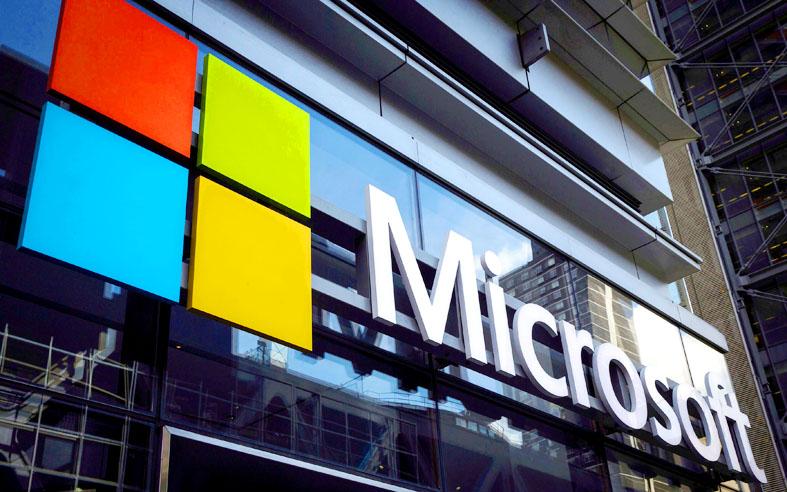At least 30,000 US organizations, including local governments, have been hacked in the past few days by an “unusually aggressive” Chinese cyberespionage campaign, a computer security specialist said.
The campaign has exploited recently discovered flaws in Microsoft Exchange software, stealing e-mails and infecting computer servers with tools that allow attackers to take control remotely, Brian Krebs said in a post on his cybersecurity news Web site.
“This is an active threat,” White House spokeswoman Jennifer Psaki said when asked about the situation during a press briefing.

Photo: Reuters
“Everyone running these servers needs to act now to patch them. We are concerned that there are a large number of victims,” she added.
After Microsoft released patches for the vulnerabilities on Tuesday, attacks “dramatically stepped up” on servers not yet updated with security fixes, said Krebs, who cited unnamed sources familiar with the situation.
“At least 30,000 organizations across the United States — including a significant number of small businesses, towns, cities and local governments — have over the past few days been hacked by an unusually aggressive Chinese cyberespionage unit that’s focused on stealing e-mail from victim organizations,” Krebs wrote in the post.
He reported that insiders said hackers have “seized control” of thousands of computer systems around the world using password-protected software tools slipped into systems.
Microsoft said early this week that a state-sponsored hacking group operating out of China is exploiting previously unknown security flaws in its Exchange e-mail services to steal data from business users.
The company said that the hacking group, which it has named “Hafnium,” is a “highly skilled and sophisticated actor.”
Hafnium has in the past targeted US-based companies, including infectious disease researchers, law firms, universities, defense contractors, think tanks and non-governmental organizations.
In a blog post on Tuesday, Microsoft executive Tom Burt said the company had released updates to fix the security flaws, which apply to on-premises versions of the software rather than cloud-based versions, and urged customers to apply them.
“We know that many nation-state actors and criminal groups will move quickly to take advantage of any unpatched systems,” he added at the time.
Microsoft said the group was based in China, but operated through leased virtual private servers in the US, and that it had briefed the US government.
Beijing has previously hit back at US accusations of state-sponsored cybertheft. Last year, it accused Washington of a smear campaign, following allegations that Chinese hackers were attempting to steal COVID-19 research.
In January, US intelligence and law enforcement agencies said that Russia was probably behind the massive SolarWinds hack that shook the government and corporate security, contradicting then-US president Donald Trump, who had suggested that China could be to blame.
Microsoft said that the Hafnium attacks “were in no way connected to the separate SolarWinds-related attacks.”

GAINING STEAM: The scheme initially failed to gather much attention, with only 188 cards issued in its first year, but gained popularity amid the COVID-19 pandemic Applications for the Employment Gold Card have increased in the past few years, with the card having been issued to a total of 13,191 people from 101 countries since its introduction in 2018, the National Development Council (NDC) said yesterday. Those who have received the card have included celebrities, such as former NBA star Dwight Howard and Australian-South Korean cheerleader Dahye Lee, the NDC said. The four-in-one Employment Gold Card combines a work permit, resident visa, Alien Resident Certificate (ARC) and re-entry permit. It was first introduced in February 2018 through the Act Governing Recruitment and Employment of Foreign Professionals (外國專業人才延攬及雇用法),

RESILIENCE: Deepening bilateral cooperation would extend the peace sustained over the 45 years since the Taiwan Relations Act, Greene said Taiwan-US relations are built on deep economic ties and shared values, American Institute in Taiwan (AIT) Director Raymond Greene said yesterday, adding that strengthening supply chain security in critical industries, enhancing societal resilience through cooperation and deepening partnerships are key to ensuring peace and stability for Taiwan in the years ahead. Greene made the remarks at the National Security Youth Forum, organized by National Taiwan University’s National Security and Strategy Studies Institution in Taipei. In his address in Mandarin Chinese, Greene said the Taiwan-US relationship is built on deep economic ties and shared interests, and grows stronger through the enduring friendship between

CAUTION URGED: Xiaohongshu and Douyin — the Chinese version of TikTok — are tools the Chinese government uses for its ‘united front’ propaganda, the MAC said Mainland Affairs Council (MAC) Minister Chiu Chui-cheng (邱垂正) yesterday urged people who use Chinese social media platforms to be cautious of being influenced by Beijing’s “united front” propaganda and undermining Taiwan’s sovereignty. Chiu made the remarks in response to queries about Chinese academic Zhang Weiwei (張維為) saying that as young Taiwanese are fond of interacting on Chinese app Xiaohongshu (小紅書, known as RedNote in English), “after unification with China, it would be easier to govern Taiwan than Hong Kong.” Zhang is professor of international relations at Shanghai’s Fudan University and director of its China Institute. When giving a speech at China’s Wuhan

ENHANCE DETERRENCE: Taiwan has to display ‘fierce resolve’ to defend itself for China to understand that the costs of war outweigh potential gains, Koo said Taiwan’s armed forces must reach a high level of combat readiness by 2027 to effectively deter a potential Chinese invasion, Minister of National Defense Wellington Koo (顧立雄) said in an interview with the Chinese-language Liberty Times (sister newspaper of the Taipei Times) published yesterday. His comments came three days after US Secretary of State Marco Rubio told the US Senate that deterring a Chinese attack on Taiwan requires making a conflict “cost more than what it’s worth.” Rubio made the remarks in response to a question about US policy on Taiwan’s defense from Republican Senator John Cornyn, who said that Chinese